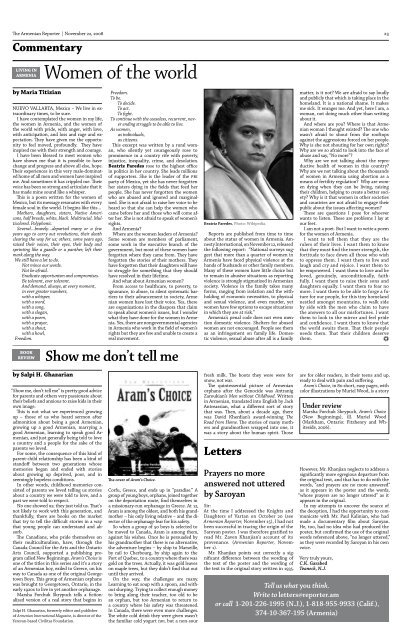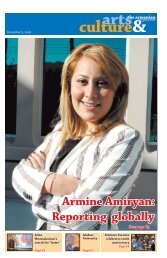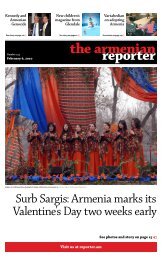And for this we are thankful.... - Armenian Reporter
And for this we are thankful.... - Armenian Reporter
And for this we are thankful.... - Armenian Reporter
You also want an ePaper? Increase the reach of your titles
YUMPU automatically turns print PDFs into web optimized ePapers that Google loves.
The <strong>Armenian</strong> <strong>Reporter</strong> | November 22, 2008 23CommentaryLiving inArmeniaWomen of the worldby Maria TitizianNUEVO VALLARTA, Mexico – We live in extraordinarytimes, to be sure.I have contemplated the women in my life,the women in Armenia, and the women ofthe world with pride, with anger, with love,with anticipation, and loss and rage and expectation.They have given me the opportunityto feel moved, profoundly. They haveinspired me with their strength and courage.I have been blessed to meet women whohave shown me that it is possible to havechange and progress and above all else, hope.Their experiences in <strong>this</strong> very male-dominatedhome of all men and women have inspiredme. <strong>And</strong> sometimes it has crippled me. Theirvoice has been so strong and articulate that ithas made mine sound like a whisper.This is a poem written <strong>for</strong> the women ofMexico, but its message resonates with everyfemale soul in the world. It begins like <strong>this</strong>…Mothers, daughters, sisters, Native Americans,half breeds, white, black. Multiracial. Multicolored.Polyphonic.Several…bravely…departed many or a fewyears ago to carry out revolutions, their deathclearing the way <strong>for</strong> us; others, some years ago,raised their voices, their eyes, their body andsprinting like a gazelle or a panther, left theirmark along the way.We still have a lot to do.Not mince our words.Not be afraid.Eradicate opportunism and compromises.Be tolerant, ever tolerant.<strong>And</strong> demand, always, at every moment,in ever greater numbers,with a whisper,with a word,with a song,with a slogan,with a poem,with a prayer,with a shout,with a howl,Freedom.bookreviewFreedom.To be.To decide.To act.To fight.To continue with the ceaseless, recurrent, neverending struggle to be able to live.As women,as individuals,as citizens.This excerpt was written by a rural woman,who silently yet courageously rose toprominence in a country rife with poverty,injustice, inequality, crime, and desolation.Beatriz P<strong>are</strong>des rose to the highest officein politics in her country. She leads millionsof supporters. She is the leader of the PRIparty of Mexico, yet she has never <strong>for</strong>gottenher sisters dying in the fields that feed herpeople. She has never <strong>for</strong>gotten the womenwho <strong>are</strong> abused and ignored and marginalized.She is not afraid to raise her voice to beheard so that she can help the women whocame be<strong>for</strong>e her and those who will come afterher. She is not afraid to speak of women’srights.<strong>And</strong> Armenia?Where <strong>are</strong> the women leaders of Armenia?Some women <strong>are</strong> members of parliament,some work in the executive branch of thegovernment, but most of these women have<strong>for</strong>gotten where they came from. They have<strong>for</strong>gotten the stories of their mothers. Theyhave <strong>for</strong>gotten that their daughters will haveto struggle <strong>for</strong> something that they shouldhave resolved in their lifetime.<strong>And</strong> what about <strong>Armenian</strong> women?From access to healthc<strong>are</strong>, to poverty, toignorance, to abuse, to silent systematic barriersto their advancement in society, <strong>Armenian</strong>women have lost their voice. Yes, there<strong>are</strong> organizations in the diaspora that claimto speak about women’s issues, but I wonderwhat they have done <strong>for</strong> the women in Armenia.Yes, there <strong>are</strong> nongovernmental agenciesin Armenia who work in the field of women’srights but they <strong>are</strong> few and unable to create <strong>are</strong>al movement.Show me don’t tell meBeatriz P<strong>are</strong>des. Photo: Wikipedia.Reports <strong>are</strong> published from time to timeabout the status of women in Armenia. AmnestyInternational, on November 12, releasedthe following report: “National surveys suggestthat more than a quarter of women inArmenia have faced physical violence at thehands of husbands or other family members.Many of these women have little choice butto remain in abusive situations as reportingviolence is strongly stigmatized in <strong>Armenian</strong>society. Violence in the family takes many<strong>for</strong>ms, ranging from isolation and the withholdingof economic necessities, to physicaland sexual violence, and even murder, yetwomen have few options to escape situationsin which they <strong>are</strong> at risk.”Armenia’s penal code does not even mentiondomestic violence. Shelters <strong>for</strong> abusedwomen <strong>are</strong> not encouraged. People see themas an infringement on family life. Domesticviolence, sexual abuse after all is a familymatter, is it not? We <strong>are</strong> afraid to say loudlyand publicly that which is taking place in thehomeland. It is a national shame. It makesme sick. It enrages me. <strong>And</strong> yet, here I am, awoman, not doing much other than writingabout it.<strong>And</strong> where <strong>are</strong> you? Where is that <strong>Armenian</strong>woman I thought existed? The one whowasn’t afraid to shout from the rooftopsagainst the aggressions <strong>for</strong>ced on her people.Why is she not shouting <strong>for</strong> her own rights?Why <strong>are</strong> <strong>we</strong> so afraid to look into the face ofabuse and say, “No more”?Why <strong>are</strong> <strong>we</strong> not talking about the reproductivehealth of women in <strong>this</strong> country?Why <strong>are</strong> <strong>we</strong> not talking about the thousandsof women in Armenia using abortion as ameans of fertility regulation? Why <strong>are</strong> womendying when they can be living, raisingtheir children, helping to create a better society?Why is it that women in other societiesand countries <strong>are</strong> not afraid to engage theirpublic about the issues affecting women?These <strong>are</strong> questions I pose <strong>for</strong> whoeverwants to listen. These <strong>are</strong> problems I lay atour feet.I am not a poet. But I want to write a poem<strong>for</strong> the women of Armenia.I want to tell them that they <strong>are</strong> therulers of their lives. I want them to knowthat they must find the inner strength, the<strong>for</strong>titude to face down all those who wishto oppress them. I want them to live andlaugh and cry and rejoice. I want them tobe empo<strong>we</strong>red. I want them to love and beloved, genuinely, unconditionally, faithfully.I want them to raise their sons anddaughters equally. I want them to fear nomore. I want them to be able to <strong>for</strong>ge a future<strong>for</strong> our people, <strong>for</strong> <strong>this</strong> tiny homelandnestled amongst mountains, to walk sideby side with the men who claim to havethe ans<strong>we</strong>rs to all our mis<strong>for</strong>tunes. I wantthem to look in the mirror and feel prideand confidence. I want them to know thatthe world awaits them. That their peopleneeds them. That their children deservethem.fby Salpi H. Ghazarian“Show me, don’t tell me” is pretty good advice<strong>for</strong> p<strong>are</strong>nts and others very passionate abouttheir beliefs and anxious to raise kids in theirown image.This is not what <strong>we</strong> experienced growingup – those of us who heard sermon afteradmonition about being a good <strong>Armenian</strong>,growing up a good <strong>Armenian</strong>, marrying agood <strong>Armenian</strong>, learning to speak good <strong>Armenian</strong>,and just generally being told to lovea country and a people <strong>for</strong> the sake of thep<strong>are</strong>nts <strong>we</strong> loved.For some, the consequence of <strong>this</strong> kind ofp<strong>are</strong>nt-child relationship has been a kind ofstandoff bet<strong>we</strong>en two generations whosememories began and ended with storiesabout growing up deprived, poor, and inseemingly hopeless conditions.In other words, childhood memories consistedof p<strong>are</strong>nts <strong>we</strong> loved telling us storiesabout a country <strong>we</strong> <strong>we</strong>re told to love, and apast <strong>we</strong> <strong>we</strong>re told to respect.No one sho<strong>we</strong>d us; they just told us. That’snot likely to work with <strong>this</strong> generation, and<strong>thankful</strong>ly, there <strong>are</strong> books on the marketthat try to tell the difficult stories in a waythat young people can understand and absorb.The Canadians, who pride themselves ontheir multiculturalism, have, through theCanada Council <strong>for</strong> the Arts and the OntarioArts Council, supported a publishing programcalled New Beginnings. Aram’s Choice isone of the titles in <strong>this</strong> series and it’s a storyof an <strong>Armenian</strong> boy, exiled to Greece, on hisway to Canada as one of the original GeorgetownBoys. This group of <strong>Armenian</strong> orphanswas brought to Georgetown, Ontario, in theearly 1920s to live in yet another orphanage.Marsha Forchuk Skrypuch tells a fictionalizedversion of a real story that begins inSalpi H. Ghazarian, <strong>for</strong>merly editor and publisherof <strong>Armenian</strong> International Magazine, is director of theYerevan-based Civilitas Foundation.The cover of Aram’s Choice.Corfu, Greece, and ends up in “paradise.” Agroup of young boys, orphans, joined togetheron the deportation route, find themselves ina missionary-run orphanage in Greece. At 12,Aram is among the oldest, and both his grandmother– his only living relative – and the directorof the orphanage fear <strong>for</strong> his safety.So when a group of 50 boys is selected tobe moved to Canada, Aram is among them,against his wishes. Once he is persuaded byhis grandmother that there is no alternative,the adventure begins – by ship to Marseille,by rail to Cherbourg, by ship again to thePort of Quebec, to a country where there wasgold on the trees. Actually, it was gold leaveson maple trees, but they didn’t find that outuntil they arrived.On the way, the challenges <strong>are</strong> many.Learning to eat soup with a spoon, and withoutslurping. Trying to collect enough moneyto bring along their teacher, too old to bean orphan, but too <strong>Armenian</strong> to return toa country where his safety was threatened.In Canada, there <strong>we</strong>re even more challenges.The white cold drink they <strong>we</strong>re given wasn’tthe familiar cold yogurt tan, but a non-sourfresh milk. The boots they wore <strong>we</strong>re <strong>for</strong>snow, not war.The quintessential picture of <strong>Armenian</strong>orphans after the Genocide was AntranigZaroukian’s Men without Childhood. Writtenin <strong>Armenian</strong>, translated into English by JackAntreassian, what a different sort of storythat was. Then, about a decade ago, therewas David Kherdian’s award-winning TheRoad from Home. The stories of many mothersand grandmothers wrapped into one, itwas a story about the human spirit. ThoseLettersPrayers no moreans<strong>we</strong>red not utteredby SaroyanSir:At the time I addressed the Knights andDaughters of Vartan on October 20 (see<strong>Armenian</strong> <strong>Reporter</strong>, November 15), I had notbeen successful in tracing the origin of theSaroyan poster. I was there<strong>for</strong>e gratified toread Mr. Zaven Khanjian’s account of itsprovenance. (<strong>Armenian</strong> <strong>Reporter</strong>, November1).Mr. Khanjian points out correctly a significantdifference bet<strong>we</strong>en the wording ofthe text of the poster and the wording ofthe text in the original story written in 1935.<strong>are</strong> <strong>for</strong> older readers, in their teens and up,ready to deal with pain and suffering.Aram’s Choice, in 80 short, easy pages, withcolor illustrations by Muriel Wood, is a storyUnder reviewMarsha Forchuk Skrypuch, Aram’s Choice(New Beginnings), ill. Muriel Wood(Markham, Ontario: Fitzhenry and Whiteside,2006).Ho<strong>we</strong>ver, Mr. Khanjian neglects to address asignificantly more egregious departure fromthe original text, and that has to do with thewords, “and prayers <strong>are</strong> no more ans<strong>we</strong>red”as it appears in the poster and the words,“whose prayers <strong>are</strong> no longer uttered” as itappears in the original.In my attempts to uncover the source ofthe deception, I had the opportunity to communicatewith Mr. Paul Kalinian, who hadmade a documentary film about Saroyan.He, too, had no idea who had produced theposter, but confirmed the use of the originalwords referenced above, “no longer uttered,”as they <strong>we</strong>re recorded by Saroyan in his ownvoice.Very truly yours,C.K. GarabedTeaneck, N.J.Tell us what you think.Write to letters@reporter.amor call 1-201-226-1995 (N.J.), 1-818-955-9933 (Calif.),374-10-367-195 (Armenia)
















